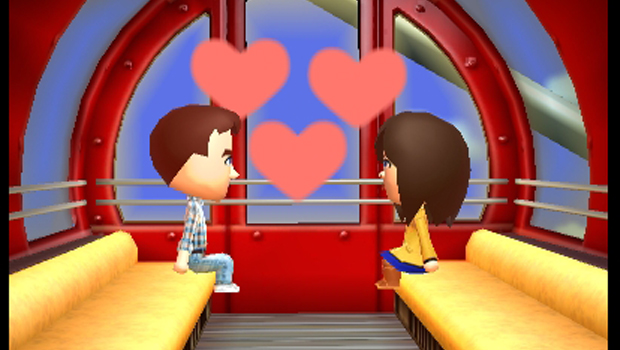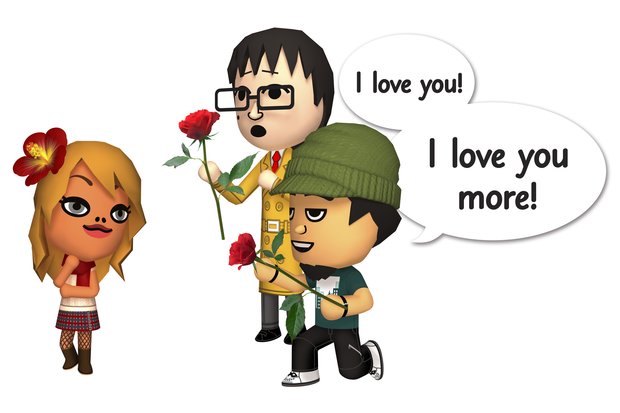Nintendo's response to demands of Miiquality: "Let's not talk about it"
Nintendo's having a really bad week. First, the good news: Pokémon Ruby and Sapphire are getting 3DS remakes--woohoo! Now the not-so-good: Nintendo's financial reports for the past fiscal year report a net loss of $229 million. That's the economic crisis, but there's also a moral crisis: the exclusion of same-sex relationships from the upcoming 3DS game Tomodachi Life. And despite the recent "#Miiquality" fan campaign, CVG News reports that no changes will be made to accommodate gay couples in the game's impending Western release.
Nintendo of America gave a statement saying that "Nintendo never intended to make any form of social commentary with the launch of 'Tomodachi Life'… We hope that all of our fans will see that 'Tomodachi Life' was intended to be a whimsical and quirky game, and that we were absolutely not trying to provide social commentary." But staying neutral, despite the pleas from fans both gay and straight to change the game, is a statement in and of itself. It shows an aversion to getting involved and taking a stand when inequality is unfolding right in front of you. Without trying to throw around weighty, provocative adjectives, NoA's response feels like a cop-out, an unwillingness to confront the idea that this "whimsical and quirky" simulation only allows for boy-girl couples, excluding any other kind of pairing.

The knee-jerk reaction is to decry Nintendo for its reluctance to face the issue, and the way it's masking exclusion as a game mechanic. You see, Tomodachi Life lets players--that is to say, a boy and girl--fall in love, and eventually have children. When Tomodachi Life was released in Japan last April, a bug was found that made same-sex relationships possible. As Nintendo's Bill Trinen described, "Essentially [you could] create a male version of a Mii character and assign their gender as female, and that was how the two males were able to have a baby." Within a month, this bug was patched, effectively eliminating the possibility of gay couples in the game.
In this case, the impossibilities of childbirth in same-sex relationships has been the fallback excuse for an exclusion of gay romance options. The same issue came up when Fire Emblem: Awakening got a Western release last year, which also prevented same-sex couples from forming. Again, the reason given was that romance was a game mechanic meant to facilitate child-rearing, so it didn't make sense for same-sex couples to produce offspring. This reasoning is Nintendo's safest option; it effectively skirts the inequality issue by not picking a side.

It's also important to consider Nintendo of America's unenviable position. Nintendo of America didn't develop or program Tomodachi Life; Japan's SPD Group 1 did. Given the company's structure, it seems like no amount of fan demand in the West can effect change on the development side in the East. To criticize Nintendo of America is to kill the messenger, no matter how ineffectual or craven that message may be. That said, NoA exists to better serve Nintendo's global audience, and it's not as though NoA is powerless to change the game just because it didn't write Tomodachi Life's source code.
A full understanding of the issue also requires intimate knowledge of Japan's attitude towards gay relationships, which many Western gamers simply don't have. I'm one of them--but after talking with a Japanese colleague, it seems that while the Japanese society doesn't discriminate against gay couples, it views homosexuality as a taboo topic that's not to be openly discussed. Tomodachi Life's Japanese release might not have raised any issues simply because there was little room for an open dialogue to begin with.
There's really no arguing that any form of exclusion is wrong, especially in an all-ages, all-genders kind of game like Tomodachi Life. But with so many cultural factors in play here, it's hard to know who to blame--or better yet, who to confront so that change can be effected, and Nintendo fans of all types can enjoy their games to the fullest. "We will continue to listen and think about the feedback," said a Nintendo rep. "We're using this as an opportunity to better understand our consumers and their expectations of us at all levels of the organization." But there comes a point when just listening isn't enough, and taking action is the only way forward.
Weekly digests, tales from the communities you love, and more
Lucas Sullivan is the former US Managing Editor of GamesRadar+. Lucas spent seven years working for GR, starting as an Associate Editor in 2012 before climbing the ranks. He left us in 2019 to pursue a career path on the other side of the fence, joining 2K Games as a Global Content Manager. Lucas doesn't get to write about games like Borderlands and Mafia anymore, but he does get to help make and market them.



